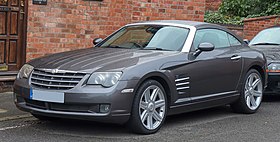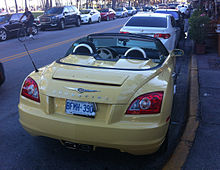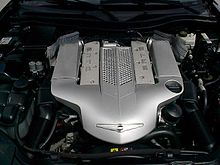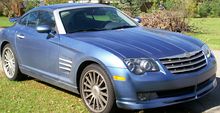Chrysler Crossfire
| Chrysler Crossfire | |
|---|---|
 | |
| Overview | |
| Manufacturer | Karmann |
| Production | February 2003 – December 2007 |
| Model years | 2004–2008 |
| Assembly | Osnabrück, Germany |
| Designer | Eric Stoddard, Andrew Dyson |
| Body and chassis | |
| Class | Sports car |
| Body style |
|
| Layout | FR layout |
| Platform |
|
| Related | Mercedes-Benz SLK-Class (R170) |
| Powertrain | |
| Engine |
|
| Transmission |
|
| Dimensions | |
| Wheelbase | 94.5 in (2,400 mm) |
| Length | 159.8 in (4,059 mm) |
| Width | 69.5 in (1,765 mm) |
| Height |
|
| Chronology | |
| Predecessor | Chrysler Prowler Chrysler TC by Maserati |
The Chrysler Crossfire is a rear-wheel drive, two-seat sports car that was sold by Chrysler and built by Karmann of Germany for the 2004 to 2008 model years.
Developed during the union of Daimler and Chrysler, the two-seater is based on the Mercedes-Benz R170 platform which shares 80% of its components with the first generation SLK. The second generation SLK was built on a new R171 platform starting in the 2005 model year; the R170 platform was essentially handed down to Chrysler for use in building the Crossfire. Having initially arrived in 2001 as a concept car styled by Eric Stoddard,[3] the Chrysler was further refined by Andrew Dyson[4] before production began in 2003 for 2004 model year sales.
Design[edit]
The name "Crossfire" refers to the two character lines that run from front to rear along the body sides — their crease directions cross below the mirrors on the door panels.[5] Conceived during the period of Chrysler's ownership by Daimler-Benz, the name also refers to the collaboration of the two companies.
The Chrysler Crossfire concept car was introduced at the 2001 North American International Auto Show and the production version unveiled at the 2002 Los Angeles Auto Show as a 2004 model "is as faithful a translation from concept to production as any in recent memory."[6][7] The concept car was made "to evoke a strong, passionate, emotional response. We had to retain that. We want to polarize our audience—we want people to love it or hate it."[6] Conceived to be a two-seat image building or halo car for the Chrysler brand, the marketing objective was also to make use of available components using a two-seat roadster chassis. The production car shares about 39% of its parts with Mercedes-Benz vehicles and Chrysler dealers were required to invest in special equipment, tools, and parts to be able to sell the new luxury model.[8] The rear-wheel-drive Crossfire coupe design objective was to make an "impression" with looks that are "unique, almost sculptural."[9]
The Crossfire's visual presence includes a wide body raked over relatively huge 19-inch rear wheels and 18-inch front wheels.[10] The most distinctive design element is the fastback roof and broad rear fenders made for a rear end design that prompted automotive journalists and writers to compare the new car to American Motors' 1965–1967 AMC Marlin.[11] The "distinctive boat-tail rear end that reminds more than one observer of the old Rambler Marlin."[12] For example, Rob Rothwell wrote "... when I first espied the rear lines of the Chrysler Crossfire I was instantly transported back to 1965 and my favorite car of that year, the Rambler Marlin."[13] Motor Trend also compared the "provocative boattail theme" of the 2004 Crossfire's sheetmetal to that of the AMC Marlin fastback.[14] Likewise, the new Chrysler's boat-tail is "formed as the edges of the roof converge into a kind of teardrop shape, leaving the rear fenders to flare out over the rear wheels."[10]
Construction and features[edit]
Chrysler executed the interior and exterior styling. All other elements of the car such as wheelbase, track, engine, transmission, chassis structure, suspension components, are shared with the R170 platform.[15] An example of this is the engine bay of the Crossfire, which is virtually identical to the Mercedes-Benz SLK320 on the R170 platform. The seats from the Mercedes-Benz SLK320 would bolt directly into the Crossfire chassis. The dashboard layout, controls and instruments are also similar to those on the Mercedes-Benz SLK320.
The standard transmission is a 6-speed manual with an optional 5-speed automatic. Base (Standard) and Limited models, originally sold beginning in the 2004 model year, are equipped with a Mercedes-Benz M112 3.2 L, 18-valve, SOHC V6 engine which produced 215 hp (160 kW) and 229 pound force-feet (310 N⋅m) of torque. SRT-6 models were equipped with a supercharged version of the M112 engine built by Mercedes' performance branch, AMG. SRT-6 models came only with the 5-speed automatic transmission, consistent with AMG cars of the same era. The 6-speed transmission used by the Chrysler Crossfire is a variant of the Mercedes sourced NSG-370. The 5-speed automatic transmission in the Crossfire (known as 5G-Tronic) is also Mercedes sourced and a variant of the 722.6 family. The automatic achieves a better EPA fuel efficiency rating over the 6MT, mostly due to the difference in gear ratios.
Unlike most cars of its time, the Crossfire does not use a rack and pinion steering system; instead, it utilizes a recirculating ball system as employed on the donor R170 platform.[15] Front suspension is unequal length (SLA) double wishbone suspension with 5 point multi link in the rear.[16] Just like the concept car, all Crossfire models were built with two different wheel sizes measuring 18x7.5-inch on the front and 19x9-inch on the rear.[17] Standard all-season tires were 225/40R18 on the front and 255/35R19 on the rear.
The first production Crossfire was driven off the assembly line on 3 February 2003, by Chrysler Group's COO Wolfgang Bernhard in Germany.[18]
Equipment[edit]
The Chrysler Crossfire's standard features included large alloy wheels with performance-rated tires, a Becker (part of Harman/Kardon)–sourced AM/FM stereo with anti-theft system and a single-disc CD player, keyless entry with security alarm, a power-retractable rear wing spoiler, leather-trimmed seating surfaces, dual power front sports bucket seats, full instrumentation, a 3.2L V6 engine with manual transmission, rear-wheel-drive (RWD), a leather-wrapped and stitched steering wheel, a power-retractable cloth convertible roof (for convertible models), front floor mats, and air conditioning.
Optional features on the Chrysler Crossfire included an automatic transmission, a six-speaker premium Infinity sound system with two "subwoofers" mounted directly behind each seat, a CD-based GPS navigational system, exterior paint colors, and additional interior color choices.
Sales and production numbers[edit]
The original contract with Karmann to build the Crossfire was for about five years with an annual sales target of 20,000 units in the United States.[19] Sales of the Crossfire were slow, with an average 230-day supply of the vehicles during November 2005. A small number of Crossfires were imported to the United States and Mexico for 2006 (and almost all of these were roadsters).[20]
Chrysler discontinued the Crossfire after the 2008 model year, as part of its restructuring plans.[21] The last Crossfire rolled off of the assembly line on December 17, 2007.
| Model Type | Model Year 2004 |
2005 | 2006 | 2007 | 2008 | Grand Total |
|---|---|---|---|---|---|---|
| Crossfire Coupe | 0 | 1807 | 770 | 434 | 0 | 3011 |
| Crossfire Limited Coupe | 22801 | 9027 | 2155 | 1063 | 826 | 35872 |
| Crossfire Limited Coupe (RHD) | 2322 | 983 | 591 | 128 | 0 | 4024 |
| Crossfire Limited Roadster (both LHD and RHD) | 0 | 18501 | 4281 | 1905 | 960 | 25647 |
| Crossfire Roadster | 0 | 1806 | 780 | 803 | 0 | 3389 |
| Crossfire SRT-6 Coupe | 0 | 2419 | 47 | 0 | 0 | 2466 |
| Crossfire SRT-6 Coupe (RHD) | 0 | 26 | 79 | 0 | 0 | 105 |
| Crossfire SRT-6 Roadster | 0 | 1252 | 69 | 0 | 0 | 1321 |
| Crossfire SRT-6 Roadster (RHD) | 0 | 78 | 101 | 0 | 0 | 179 |
| Grand Total | 25123 | 35899 | 8873 | 4333 | 1786 | 76014 |
- Notes:
- LHD = Left hand drive (or steering wheel on the left side)
- RHD = Right hand drive (or steering wheel on the right side)
- Crossfire Coupe and Crossfire Roadster refer to the "Base" model
| Year[23][24] | 2003 | 2004 | 2005 | 2006 | 2007 |
|---|---|---|---|---|---|
| Production | 35,700 | 28,000 | 12,500 | 4,805 | 2,000 |
- Note: Cars produced in one calendar year may be marketed as the following model year.
Models[edit]
| Model | Years | Engine | Displacement | Power | Torque | Handling | 0-60 mph (97 km/h) | Top Speed |
|---|---|---|---|---|---|---|---|---|
| Limited | 2004–2008 | 3.2L V6 | 195.2 cu in (3199 cc)[1] | 215 hp (160 kW; 218 PS)[1] | 229 lb⋅ft (310 N⋅m)[1] | Skid pad 1.0g
70 – 0 mph in 161 ft.[25] |
6.4 sec (6-speed manual)[26] |
155 mph (electronically limited) |
| Base (Standard) | 2005–2008 | |||||||
| SRT-6 | 2005–2006 | Supercharged 3.2L V6 | 330 hp (246 kW; 335 PS)[2] | 310 lb⋅ft (420 N⋅m) | Skid pad 1.0g
70 – 0 mph in 157 ft.[25] |
4.8 sec (5-speed automatic)[27] | 155 mph (electronically limited) |
Base and Limited[edit]
For the first model year (2004), only the coupe was offered (with no trim levels), equipped quite similarly to the next year's Limited model. In model year 2005, there were two models available; Coupe and Roadster, each with three trim levels: Base (with fewer amenities), Limited, and SRT-6 (supercharged). There was an SE Roadster model (essentially a base model) in 2006-2007 available only in Blaze Red Crystal Pearl and with black accented 15-spoke SRT-6 style wheels. Base Crossfire models, both Coupe and Roadster, have black painted windshield frames, black filler plugs (in place of fog-lights) in the front fascia, and fabric seats with separate, movable headrests. Limited and SRT-6 models, both Coupe and Roadster, all have silver painted windshield frames and are equipped with fog lights. The Limited has leather upholstery. The SRT-6 model has unique Leather/Alcantara upholstery. All Base and Limited Crossfire models included an electronic wing on the back hatch that would go up at about 65 mph and comes back down at 45 mph. The wing had a manual switch to raise it and lower it at any speed.
SRT-6[edit]
The SRT-6 trim level, as both coupe and convertible, featured an Mercedes-Benz AMG M112 3.2L V6 supercharged engine delivering 330 hp (246 kW) and 310 lb⋅ft (420 N⋅m) of torque.[2] Other SRT-6 model-specific features included suspension and brake modifications, a front fascia air dam and a fixed rear spoiler. The Crossfire SRT-6 model used the same drivetrain, suspension, and braking components as those used on the Mercedes-Benz SLK 32 AMG. The standard tires were upgraded to Z-rated Michelin Pilot Sports, sized 225/40R18 on the front and 255/35R19s in back.[28] The SRT-6 cars did not feature the electronic wing that the Base and Standard cars featured.
In 2006, the SRT-6 was changed to special order only.
Notes[edit]
- ^ Jump up to: a b c d "2008 Crossfire Feature Availability and Specifications" (PDF). Chrysler media. Archived from the original (PDF) on February 13, 2012. Retrieved January 13, 2018.
- ^ Jump up to: a b c "2006 Chrysler Crossfire Specifications" (PDF). Chrysler media. pp. 10–13. Archived from the original (PDF) on September 5, 2012. Retrieved January 13, 2018.
- ^ Patton, Phil (May 27, 2007). "From a Bad Marriage, Pretty Babies". The New York Times. Retrieved April 2, 2013.
- ^ Joe, Lorio (April 2009). "Chrysler Crossfire – Road Test & Review". Automobile. Retrieved March 15, 2013.
- ^ Odell, John (May 28, 2003). "Chrysler Crossfire: Los Angeles Times's view". The Los Angeles Times. cars.com. Retrieved November 24, 2017.
- ^ Jump up to: a b Wyss, Wallace A. (April 2003). "Chrysler Crossfire - Car News". Car and Driver. Retrieved November 24, 2017.
- ^ "Preview: '04 Chrysler Crossfire". The Car Connection. January 7, 2002. Retrieved November 24, 2017.
- ^ Connelly, Mary (June 2, 2003). "Crossfire purely an 'image car'". Automotive News. Retrieved November 25, 2017.
- ^ Williams, Paul (August 10, 2011). "Car Review: 2004 Chrysler Crossfire Limited". Driving. Retrieved November 24, 2017.
- ^ Jump up to: a b Neil, Dan (October 1, 2003). "Caught up in the Crossfire". The Los Angeles Times. Retrieved November 24, 2017.
- ^ Cranswick, Marc (2011). The Cars of American Motors: An Illustrated History. McFarland. p. 74. ISBN 978-0-7864-4672-8. Retrieved November 24, 2017.
- ^ Lienert, Paul (March 26, 2003). "Crossfire's looks sizzle, performance sputters". The Detroit News.
- ^ Rothwell, Rob (May 2, 2004). "2004 Chrysler Crossfire Coupe Road Test". auto 123. Retrieved November 24, 2017.
- ^ Sessions, Ron (May 2003). "First Drive: 2004 Chrysler Crossfire". Motor Trend. Retrieved November 24, 2017.
- ^ Jump up to: a b Edmonson, Gail; Kerwin, Kathleen (September 29, 2003). "DaimlerChrysler: Stalled". BusinessWeek. Retrieved April 2, 2013.
- ^ Lorio, Joe (April 2009). "Chrysler Crossfire – Road Test & Review". Automobile. Retrieved March 15, 2013.
- ^ Stewart, Ben (June 2003). "Automotive: Reports From Around The World". Popular Mechanics. 180 (6): 50. Retrieved January 13, 2018.
- ^ "hrysler Group COO Wolfgang Bernhard drives first, all-new 2004 Chrysler Crossfire off the production line" (Press release). business.highbeam.com. February 3, 2003. Archived from the original on January 7, 2016. Retrieved April 3, 2013.
- ^ "USA: Chrysler's Crossfire 'halo' car has doubtful future". just-auto. September 30, 2005. Retrieved November 24, 2017.
- ^ "Overstock.com Announces New Marketing Partnership With Chrysler Group" (Press release). Overstock.com. Archived from the original on February 10, 2009. Retrieved April 2, 2013.
- ^ Durbin, Dee-Ann (November 1, 2007). "Chrysler to cut up to 12,000 jobs". Associated Press. Archived from the original on November 3, 2007. Retrieved April 2, 2013.
- ^ "Officially recognized production numbers by CICCI". November 23, 2013.
- ^ Waterman, Stuart (March 14, 2006). "Chrysler caught in own Crossfire?". Autoblog.com. Retrieved April 2, 2013.
- ^ Figures for 2006/2007: Automobil Revue, catalogue edition 2008, p. 47.
- ^ Jump up to: a b "2004 Chrysler Crossfire (from DaimlerChrysler Press Release)". Serious Wheels. Retrieved April 2, 2013.
- ^ DeLorenzo, Matt (October 2009). "2004 Chrysler Crossfire – Road Test — Where style is substance". Road & Track. Archived from the original on August 31, 2012. Retrieved January 13, 2018.
- ^ Robinson, Aaron (March 2005). "2005 Chrysler Crossfire SRT-6 – Comparison Tests". Car & Driver. Archived from the original on June 9, 2011. Retrieved April 2, 2013.
- ^ New Cars and Trucks Buyer's Guide. Edmunds. 2006. p. 217. Retrieved January 13, 2018.
References[edit]
- Holmes, Mark (2007). Ultimate Convertibles: Roofless Beauty. London: Kandour. pp. 62–63. ISBN 978-1-905741-62-5.
- Robinson, Aaron (August 2004). "Chrysler Crossfire SRT-6 – Road Test". Car & Driver. Retrieved April 2, 2013.
- "2004 Chrysler Crossfire". Automobile. Archived from the original on February 6, 2012. Retrieved April 2, 2013.
- "2005 Chrysler Crossfire Roadster". Business Week. December 27, 2005. Archived from the original on June 26, 2012. Retrieved 2 April 2013.
- "2004 Crossfire SRT-6 Packs Punch". Motor Trend: 30. May 2004.
External links[edit]
| Wikimedia Commons has media related to Chrysler Crossfire. |
- www.srt-6.com - A Chrysler Crossfire SRT-6 website with VIN# gallery and DIYs. Made for SRT-6 enthusiasts by SRT-6 enthusiasts
- Crossfire on allpar.com
- "Crossfire SRT-6 Heritage". Official SRT web site. Retrieved April 2, 2013.
| show « previous — Chrysler car timeline, 1970–present
|
|---|
| show |
|---|



